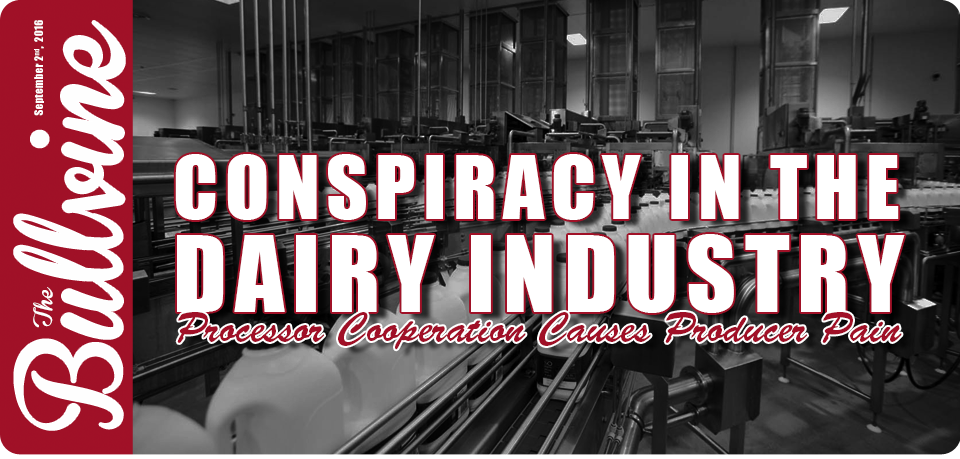United we stand divided we fall. That simple statement explains the reason many milk producers are finding themselves at the short end of the stick. Dairy processors understand that if they work together their fortunes rise, while dairy farmers seem to think, “As long as I just work harder and produce more milk, things have to get better…..right?” Wrong!
While a rebalancing of world supply and demand appears to be underway, with milk prices starting to rise around the world, there is still one major issue, at least from a producer standpoint that is holding producers down. Producers have no power. You see producers are trying to do what they think is best from their viewpoint/operation. The challenge is this micro perspective sometimes causes macro problems. Stated simply, producers are trying to produce more milk to help drive revenue. In doing so, they are creating an oversupply to the industry and hence a lower overall milk price.
With increasing supply and static to decreasing demand worldwide, milk prices have plummeted. But these losses have not been felt throughout the entire industry. In fact, consumer milk prices worldwide have been stable, while prices paid to the producers have hit record lows. So who’s making all the money? The processors. Despite these economic conditions, many of the top processors in the world are reporting 60+% increases in profits.
Furthermore, certain markets have seen drastic reductions in the price at which milk is sold to consumers. Such as Australia where milk is $1/L. Everyone there wants to blame the grocery stores or the processors. In fact, it’s the producers that are to blame. We cannot blame the likes of Coles or Woolworths because someone had to sell them the milk in the first place. You see they are not going to sell it at a loss, so someone had to sell it to them cheaper. Then the blame shifts to the processors…. but, there again, someone had to sell them the milk cheaper in the first place. And hence the challenge. You see processors are more than happy to work together and drive milk prices lower, because they know they can drive prices lower to the producers and still protect and, in some cases, even increase their margins and profits.
The pain producers around the world are feeling is a direct result of the fact that we as an industry have always worried about our bottom line. I find it interesting that as a community we are great about supporting each other and boast about how well we all get along. Yet its producers not working together that has lead to the processors having the power and the profits in our industry. Instead of uniting to give power back to the producers, we produce more milk trying to undercut our neighbours. More worried about staying afloat ourselves than solving the bigger issue.
We are all waiting for someone else to solve the problem for us. The thing is, the industry has shown us how they are going to handle this. They are just going to drive the price down to consumers and ensure that their bottom line is protected. And no matter how much consumption increases or decreases its always going to be the producer that is going to feel the pain. We are takers, not dictators. And hence we complain, but ultimately nothing changes.
Even now as we start to see a slight increase in milk prices. Milk processors and co-ops in New Zealand and Europe are beginning to increase payout prices to farmers. Producers will ramp up quickly with that price signal, and this would stall the needed supply contraction before it even gets started. You see as long as the processors get enough milk at current low prices there is no incentive to them to increase farm gate milk prices significantly.
Milk prices are not going to change dramatically over the next few years. Sure we see slight increases. But that is just the market taking the decreased supply into account. That means that we will see a one-time increase in price which we have, but this will not be a trend going forward.
One of the only changes I do see happening is that we are losing the next generation of dairy farmers. Young people these days are seeing the cost to get into the industry combined with the long hours resulting in minimal income and are choosing to go work in other industries instead. This is a problem we may never be able to overcome. Sadly, it might result in less milk production long term, and it will have irreversible effects on our community as a whole.
The Bullvine Bottom Line
History has shown us that wars are not won by those who are the strongest. They are won by those who can work together the best. In the dairy wars, processors have proven they can cooperate to protect their bottom line. This has resulted in even great producer pain as producers keep playing into the processor’s hands by producing more and more milk at lower and lower prices. For a community that is strong in spirit, dairy producers are weak on economics. We have proven to be easily divided and hence conquered. Until we start to direct our futures, we will always be feeling producer pain.
Get original “Bullvine” content sent straight to your email inbox for free.



















Leave a Reply
You must be logged in to post a comment.